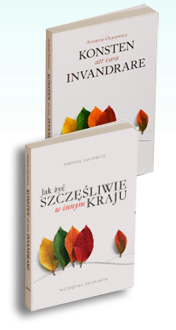Excerpts from the book
The longer I live abroad, the more careful I am about characterizing something as typically Swedish.
Kjell Albin Abrahamson
Shattered conceptions
Throughout childhood, we are fed with praise for our own country from all directions. Within the family, in school, and from our entire surroundings we hear that such and such poet or composer is celebrated abroad; that a specific event in our history has been of decisive importance for the wider world; that a certain city or one of our architectural works is lauded for its beauty even outside the country's borders.
When we come to a new country, we realize to our surprise that our country is rather unknown to our new countrymen who perhaps cannot even locate it on the map, confuse it with some other country, or do not know what language is spoken there or the name of the capital. Moreover, we soon discover that what is happening in our homeland is often of little interest to them.
Olle Wästberg recounts:
When I was Consul General in New York, I used to say that is was a bad day when someone had called our office and inquired about visas to Switzerland, and a somewhat worse day when they wanted to get a visa to Swaziland. (...) I meet an academic who delicately asks: "Sweden, is that the capital of Vienna?" (...) Sweden is perhaps not as well-known as we think.
Sometimes, we discover that what we thought was unique to our own country and our own culture - like a food or a dance - is also found in the new country. We may try to convince the surroundings that this phenomenon really has its origins in our country and is specific to our culture. But we are fighting a hopeless battle. We do not understand that nothing is really unique in the world, that everything is more or less borrowed, copied, and transformed into "our own".
On top of it all, it becomes clear to us that certain phenomena in our country are not only unknown to our hosts, but are so completely alien that they could not even imagine assimilating them. A tradition that is important to us is considered a peculiar spectacle, our music can sound unpleasant to our host population's ears, and that dish we love is met with distaste.
We can feel nonplussed when we get ignorant or prejudiced questions about our country. We are amazed at the stupidity we encounter and feel hurt because we think that these are things that everyone should know, particularly as we ourselves know so much more about their country. We easily draw the conclusion that our new countrymen are ignorant and nonchalant.
How easily we forget how little we ourselves knew about the country we have chosen to settle in, and that we have learned about it after first having lived here awhile. Seen from this perspective, it is unfair to condemn the natives' lack of knowledge as perhaps they have not even visited our country. We must also remember that the biased, ignorant, and insinuating questions are few and that situations of this kind do not arise especially often. That is why it is unfair to judge all by the few simple-minded.
It is just as well that we spare our nerves and take it easy when someone asks about polar bears or lions walking on the streets of our homelands. We should instead, perhaps, pull out a globe, spin it, close our eyes, and place our finger somewhere on it. We can then say everything we know about the country our finger is pointing at. Repeat this several times. If, perchance, we know something about the indicated countries, it would be good if we investigate how much is true and how much is heresay and bias. If we measure our knowledge against facts, we might stop judging others. Self-insight always makes life easier to live.



